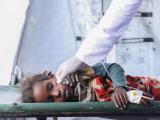Mar 22, 2006 (CIDRAP News) – An outbreak of apparent botulism associated with home-preserved bamboo shoots has sickened more than 150 people following a festival in northern Thailand, according to the World Health Organization (WHO).
The Thai Ministry of Public Health (MOPH) determined that 152 people had signs and symptoms consistent with botulism by Mar 20, the WHO reported today. All the patients had eaten traditionally prepared pickled bamboo shoots, the WHO said.
A hundred people were hospitalized, and 40 of them needed respirators, but no one has died to date, the WHO said. The Bangkok Post reported today that 42 of the patients were comatose.
The sick people were among about 170 who participated in a Buddhist festival in Banluang district of Nan province last week, China’s Xinhua news service reported.
Botulism, caused by Clostridium botulinum toxin, leads to vomiting, diarrhea, blurred vision, cranial nerve dysfunction, respiratory failure, and sometimes death. It has an incubation period of 12 hours to 3 days, but recovery may take months.
Thai health officials tracked and recalled the bamboo shoots and are educating the public on food safety, WHO said. The authorities seized 21 cans and 550 bags of bamboo shoots yesterday, the Bangkok Post reported. Those samples will be examined as part of the ongoing investigation.
A case-control and cohort study is under way, with WHO, MOPH, and the US Centers for Disease Control and Prevention (CDC) investigating the incident.
Sixty doses of antitoxin from the United Kingdom, the United States, and drug manufacturer Sanofi-Pasteur have been provided to Thailand, the WHO said. In addition, Xinhua reported today that Japan is sending 70 doses of antitoxin and experts to help investigate.
About 40 seriously ill patients will be flown by helicopter from northern Thailand to hospitals in Bangkok, according to Xinhua.
Botulinum toxin has been weaponized and is considered a Category A biological weapon, one of a group of agents that can be easily disseminated, cause high mortality, might cause public panic, and require special action for public health preparedness.
Although C botulinum is one of several agents used in biological weapons, the New York Times reported today that Thai officials have “given no indication that the food poisoning originated from anything but contaminated food.”
See also:
CIDRAP overview of botulism
http://www.cidrap.umn.edu/cidrap/content/bt/botulism/biofacts/index.html
CIDRAP guide to foodborne disease
http://www.cidrap.umn.edu/cidrap/content/fs/food-disease/causes/causes-foodborne.html


















